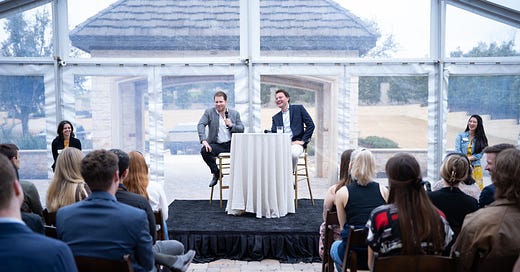Introducing the Manifesto of the Austin Union
The University of Austin's student debate society is founded on norms of civility and inspired by the fearless pursuit of truth.
Manifesto author Liv Hagye is the strategic marketing manager in UATX’s Office of Entrepreneurship and Leadership (OEL) and an alumna of the University of Texas School of Law.
Hagye says: “I was inspired by the storied Oxford Union I experienced during my studies at the University of Oxford in England. Part of my role at OEL is to help launch new initiatives critical to realizing UATX’s mission. I believe a student debate society founded on civil discourse is necessary for a university committed to open inquiry."
"I have high hopes for what the Austin Union will ignite in our students."
The University of Austin is dedicated to the fearless pursuit of truth. Our commitment to the principles of academic freedom, liberal education, innovation, fair-minded and open inquiry, and civil discourse as the tools by which we discover truth are not parchment guarantees, but our university’s foundational principles. Through the Austin Union, we will promote these principles.
Many universities claim to be committed to academic freedom, including freedom of speech and inquiry. And this commitment has served as a sound lodestar by which universities have oriented their curriculum and culture. But academic freedom is not necessarily an end in itself: it assumes the durability of a deeper foundation. Academic freedom ceases to matter if the students and faculty who exercise it do not believe that life has an innate purpose, that truth can be discovered, and that our existence ought to be guided by something outside of our own passions.
The past decades have seen the emergence of a new culture, one that undermines meaning, morality, and truth’s existence. This new culture erodes the Western liberal values that bind our nation together. Radical individualism, the idea that one’s personal identity is unrestrained by nature or tradition, has replaced all other religious or philosophical considerations as the standard for judging personal and political activity. Without a shared outlook on the greatest questions, without a shared belief that the greatest questions are even worth asking, deliberation is impossible. Conversations become innately contentious, innately us versus them. Discourse is reduced from a shared pursuit of truth to a clash of unmoored opinions.
Slowly but surely, it has become clear that freedom alone, without truth as the lodestar, causes societies to spiral into chaos, and erodes personal relationships and meaning. Our thriving requires orientation towards something outside of ourselves. The University of Austin’s fearless pursuit of truth empowers freedom to act as a tool, as a sine qua non, towards the highest of human ends: the pursuit of an understanding of existence that is beyond ourselves. Without truth as a lodestar, there is no true freedom; at best we are left with the freedom to debate and ask questions, but only so long as we do not offend others’ personal ideologies.
This is what makes the University of Austin unique. Many universities claim to champion freedom of speech, but we offer students a far more profound freedom: the opportunity to engage in the pursuit of truth, the highest human end. This pursuit will shape UATX’s education in multiple ways, from Chatham House rule in the classroom to constitutional protections for the freedom of inquiry of faculty and students. But the Austin Union is about one specific form of practice: bringing true debate back to the forefront of American universities as a way to widen, test, and refine our perceptions of truth.
Debate still thrives in certain unions around the world, but for many, especially outside of academia, debate is a lost art. Any attempt to strike up a friendly counterpoint to a co-worker’s political stance in contemporary America will likely lead to a retort that any such counterpoint is immoral and offensive, that each is entitled to his or her own view, and to question that view as egregious. But opinions cannot be refined without resistance. No two people can build a relationship without laying the bricks of disagreement to rest between themselves. No society can be sustained without a peaceful mode of public civil discourse.
Debate is a necessary part of life, and it must be modeled within our higher institutions—institutions of education, yes, but also of politics, culture, and media. Through the Austin Union, UATX will build a model of civil discourse.



